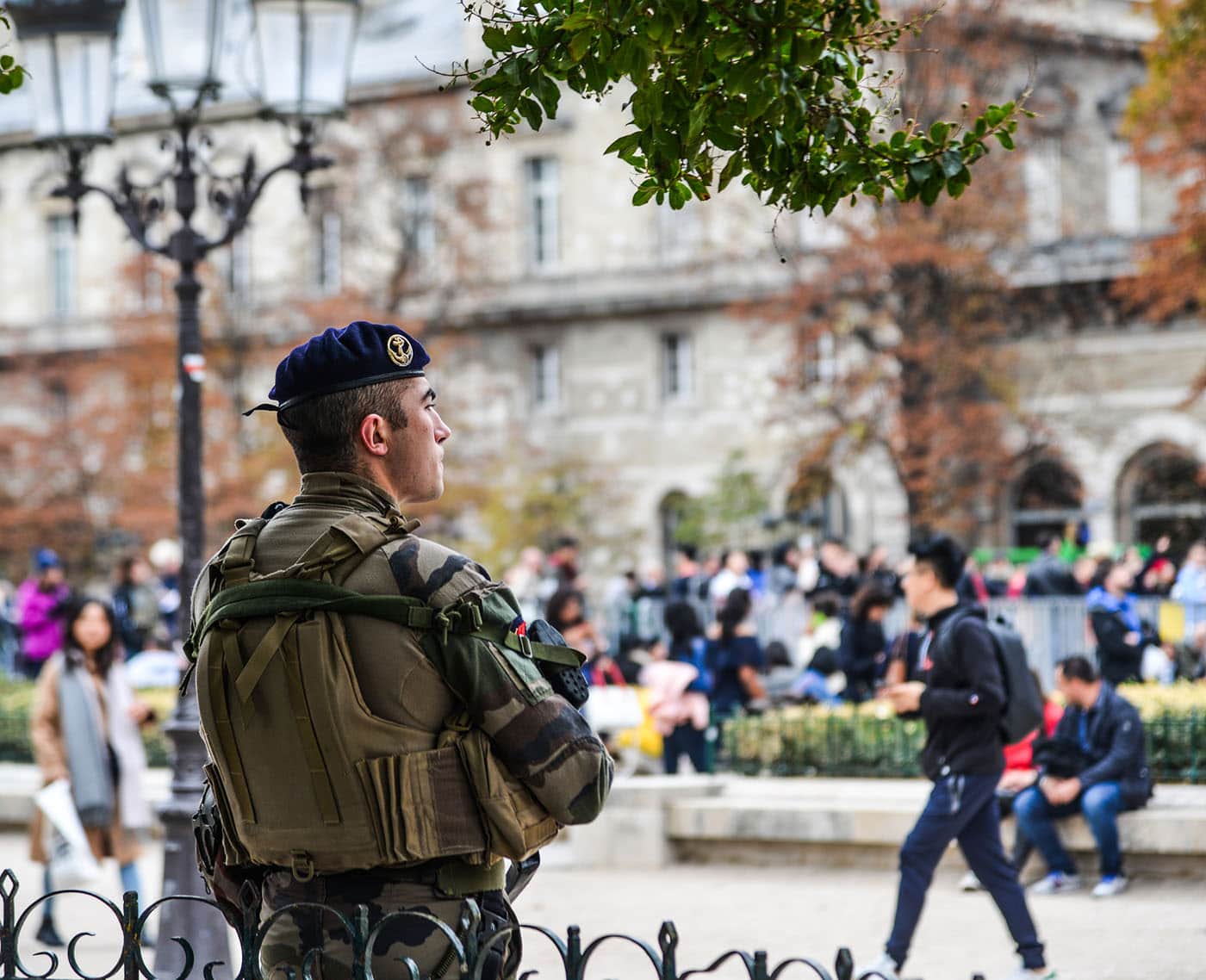
Paris is one of the most visited cities in the world, so it certainly has its share of tourism-related petty crime, but overall Paris is very safe.
In this guide, we’ll cover everything you need to know about staying safe in Paris—including the best & worst neighborhoods, tips for visiting Paris alone, common travel scams, avoiding pickpockets, taxi scams, and more tips from locals about how to stay safe in Paris.
Is Paris Safe to Visit?
Yes, Paris is safe—especially when it comes to violent crimes like assaults and mugging so your physical safety is rarely something you’ll need to worry about. But Paris is still a major city with its fair share of “big city problems,” so you should follow the same general commonsense advice you would when visiting any large city.
However, like any major tourist destination, petty crimes like pickpocketing, theft, and general tourist scams are common. Luckily these can all be avoided by taking a few simple proactive steps and being aware of the typical methods used by thieves.
Topics Covered In This Article
- Avoiding Pickpockets in Paris
- What Parts of Paris Are Dangerous?
- What Are The Safest Areas of Paris?
- Common Tourist Scams in Paris
- Is the Paris Metro (Subway) Safe?
- Is Paris Safe For Solo Women Travelers?
- Is It Safe To Visit Paris Alone?
- Is It Safe To Walk Around Paris At Night?
- General Paris Safety Tips
Avoiding Pickpockets In Paris
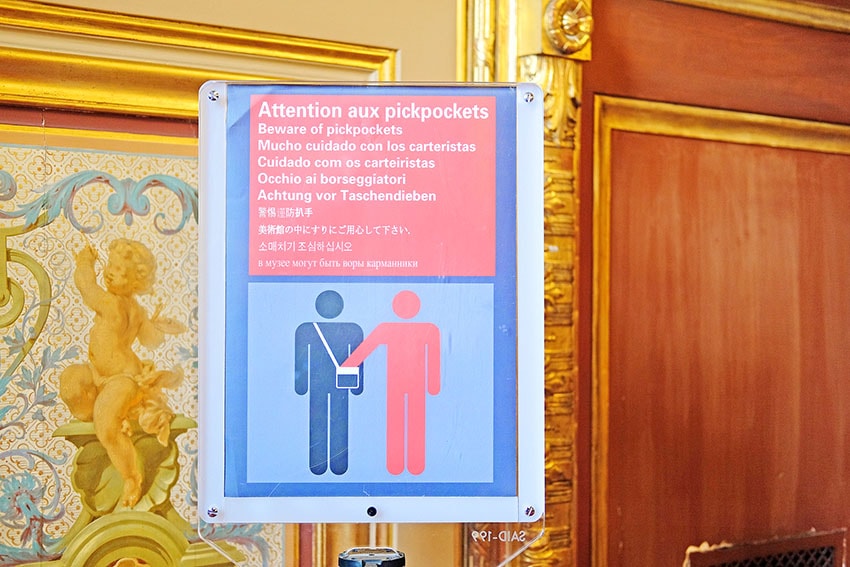
The most common type of crime tourists in Paris might encounter is pickpocketing—I’ve written extensively about pickpockets in Europe if you want to learn more. In fact, Paris consistently ranks as one of the top five European cities for pickpocketing incidents.
And since this is such a common problem, I’m going to spend a little extra time on the subject.
What Items Pickpockets Target
Purses, wallets, and cash are always prime targets for pickpockets but mobile phones are probably the most stolen items since they’re valuable and easy to resale.
Where Pickpockets Are Most Common in Paris
The most likely places to get pickpocketed are major tourist sites like the Eiffel Tower, Notre Dame, Sacré-Cœur/Montmartre, and the Champs-Elysées.
The metro, busses, and train stations are also very popular targets for pickpockets. The train from the airport to the city attracts many pickpockets since anyone with a suitcase makes an easy target.
Bustling sidewalk cafes are another popular spot where phones and purses disappear.
More and more pickpockets have started to target museums as well—especially the Louvre since it draws huge crowds (in fact, some Louvre employees went on strike a few years ago because it was getting so bad).
Who Are Pickpockets
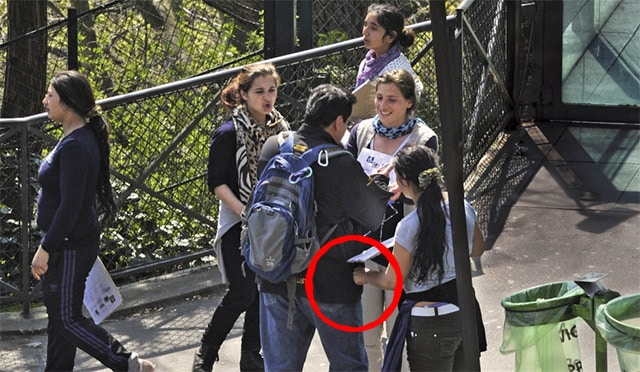
First, visitors are often surprised that a vast majority of pickpockets in Paris are aged 12 and 16 since French law makes it nearly impossible to arrest minors.
Second, many pickpockets are also female because women aren’t often perceived as threats so they make better pickpockets.
Thirds, almost all pickpockets work in small groups. This makes it easier for them to distract their targets and it’s harder to catch a group when they split up if detected.
Common Tactics Used By Pickpockets in Paris
Almost all pickpockets use confusion and distraction to rob their victims.
Typically they’ll target places where there are a lot of people crammed together into a small amount of space—like a busy subway car, a packed bus, a chaotic train station, a group of people watching a street performer, crowded farmers markets, ATMs/ticket machines, etc.
The small group of pickpockets will secretly surround their victim. One or two might try distracting the victim by blocking their way, shoving a map or “charity petition” clipboard in their face, causing a commotion, or something similar that diverts their attention.
While this is happening, someone else in the group will be going through the victim’s bag or pockets. Then they’ll all disperse in different directions.
It all happens very quickly.
What Parts of Paris Are Dangerous?
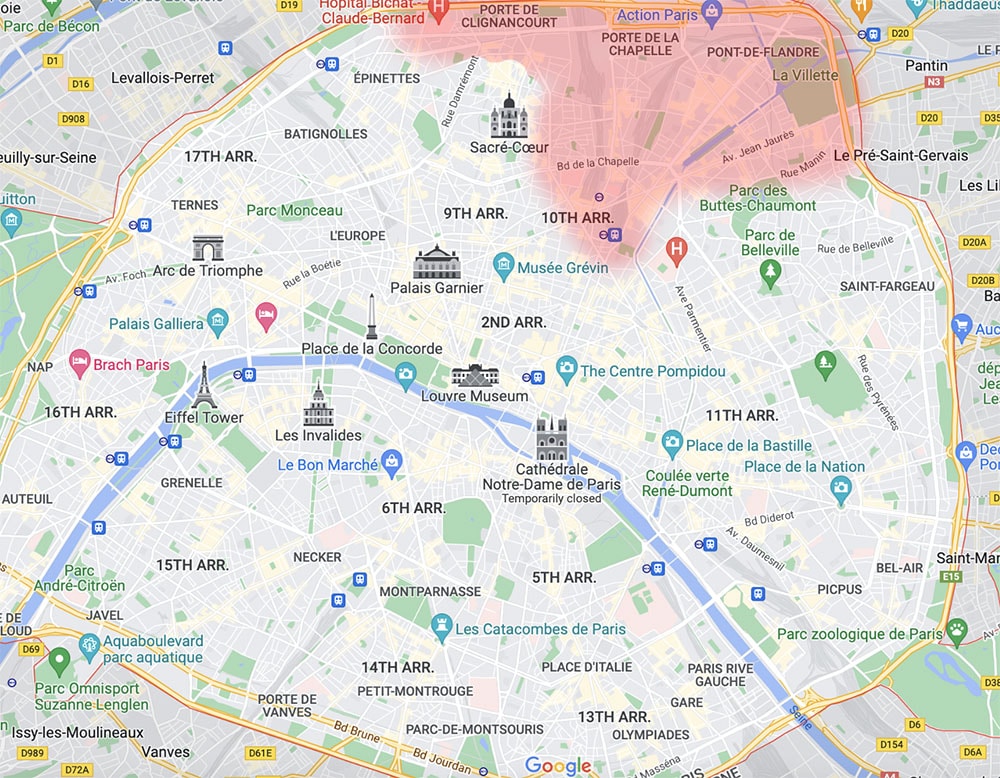
A vast majority of Paris is perfectly safe but there are a few neighborhoods/areas that are a bit more sketchy. I don’t want to paint these entire areas as “dangerous” (because some parts are perfectly nice) but these neighborhoods don’t offer much in terms of tourist sights anyways so there isn’t much reason to go/stay there.
Gare du Nord and Gare de l’Est Area
The area around the Gare du Nord Gare de l’Est train stations aren’t the best parts of Paris so they feel a bit dodgy—train stations always tend to attract scammers and sketchy people.
These neighborhoods aren’t particularly pretty, and while they’re pretty safe during the day since there are thousands of people rushing around, some visitors report feeling somewhat uneasy walking around at night when things get quiet.
Northern 18th and 19th Districts of Paris
The 18th Arrondissement is home to the beautiful Montmartre neighborhood but the northern portion of the 18th can get a little sketchy. Much of the 19th Arrondissement (specifically around the Barbès–Rochechouart/Stalingrad/Jaures metro stations, Porte de la Chapelle, Marx Dormoy, La Chappelle, Porte de Clignancourt, and Porte de la Villette) can also feel unwelcoming to visitors—some pockets are perfectly fine but the area doesn’t feel like “classic Paris” so I wouldn’t recommend staying there anyways.
Suburbs Outside Central Paris
People visiting Paris rarely visit the Parisian suburbs located directly outside the city but two popular destinations are St. Ouen (famous for its St. Ouen Flea Market) and Saint-Denis (notable for its Basilica of Saint-Denis). The areas surrounding both areas can be a bit dodgy.
What Are The Safest Areas of Paris?
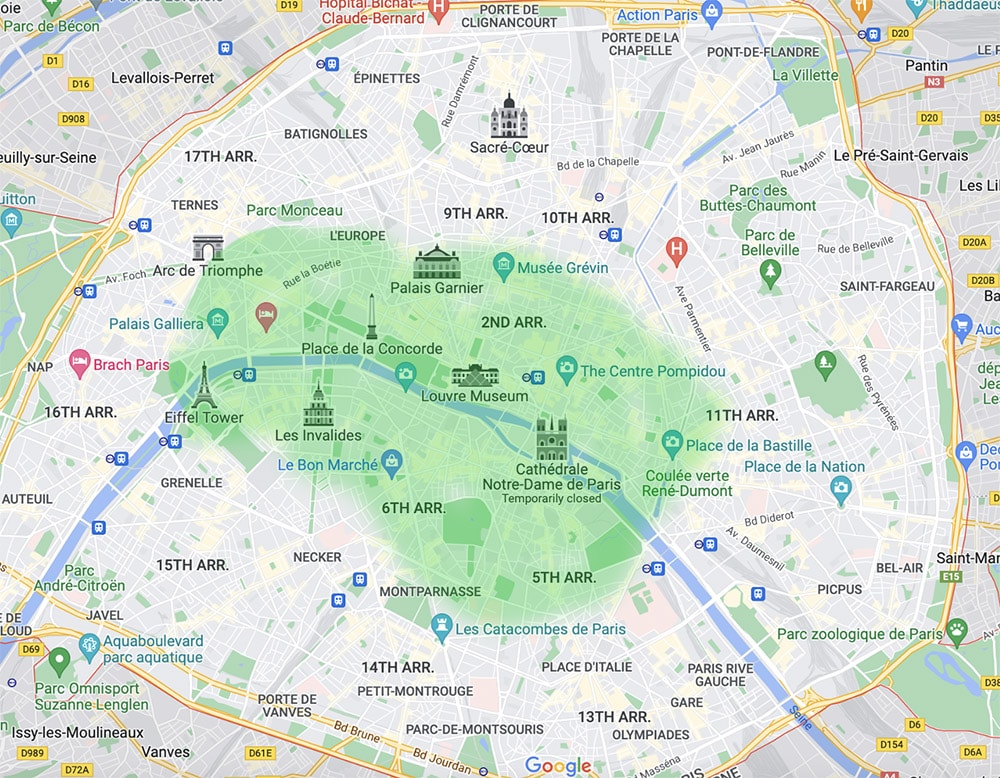
If safety is of high concern, I recommend staying as close to the center of Paris as possible. Most consider Notre Dame Cathedral to be the “center” of Paris so anywhere around there is going to be safe. All the areas in green are generally full of life so there are always people out and about—which adds to the safety.
Most of the areas outside the green are also very safe but they’re often a bit quieter and residential so they might not always have that “classic Paris” vibe.
The Best Neighborhoods In Paris
I’ve written an in-depth guide about the best neighborhoods in Paris but below are my top picks:
- THE MARAIS (3RD/4TH): The Marais is cool, trendy, chic, full of energy, and the location is great. It’s full of bars, restaurants, bakeries, and cafes. It has a ton of great shopping and boutiques. It also has a handful of excellent museums. It truly has something for everybody.
- THE LATIN QUARTER (5TH): The Latin Quarter, along with its slightly trendier/upscale neighbor St. Germain, are undoubtedly classic Paris. It has grand boulevards, tiny streets that date back to nearly 1000 years, cafes, restaurants, shopping, bars… you get the idea.
- SAINT-GERMAIN-DES-PRÉS (6TH): St. Germain is classic Paris. It’s also famous for its classic Parisian cafes that were frequented by literary icons like Hemingway. It’s undoubtedly a beautiful part of Paris and its location is unbeatable.
Common Tourist Scams in Paris
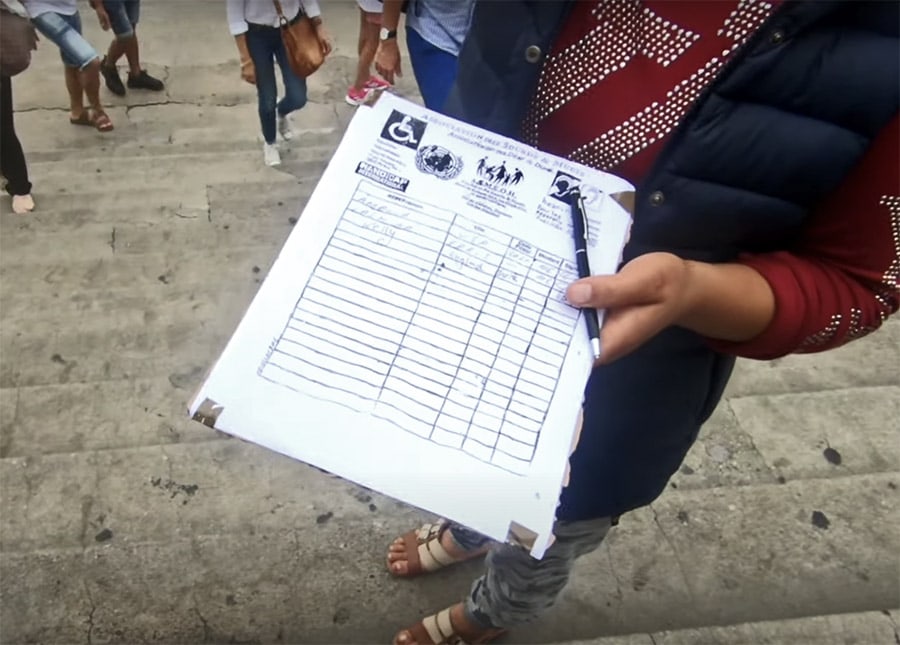
Let’s take a look at some of the most common scams that thieves use to rip off tourists visiting Paris. You can read more about all the common methods used by thieves in my Guide To Tourist Scams in Europe.
Charity Petition Scam
The most prevalent scam in Paris is the charity petition scam. This scam involves groups of young women who approach you with a clipboard and ask you to sign a petition. Then they’ll ask for a donation to their cause/charity.
But there is no charity. All the money collected is given to criminal gangs who bring more young girls from Eastern Europe to Paris to collect more money. Here’s a France 24 article about the whole criminal process.
And, oftentimes, these girls will try pickpocketing you while you’re signing the petition.
You’ll find these scammers in every tourist-heavy part of Paris.
String Bracelet Scam
You might be approached by a group of men who grab your wrist and tie a string “friendship bracelet” around your wrist or finger—then they demand €5-€10 as payment. This puts you in an awkward position since you’re literally connected to the scammer.
This is very common near the Sacré-Cœur but you’ll find them at other places in Paris as well.
It’s best to ignore them and keep walking.
ATM Rush
You’re always in a vulnerable position when getting money out of an ATM. One common scam tactic involves a group of people (usually children) who wait until you’ve entered your ATM code and then they rush up and distract you while another person grabs your cash.
It’s best to use an ATM that’s indoors where possible or visit the ATM with another person who can watch your back.
Map Distraction
In general, anytime someone shoves a map (or any piece of paper) in your face, they’re probably trying to pickpocket you.
Is the Paris Metro (Subway) Safe?
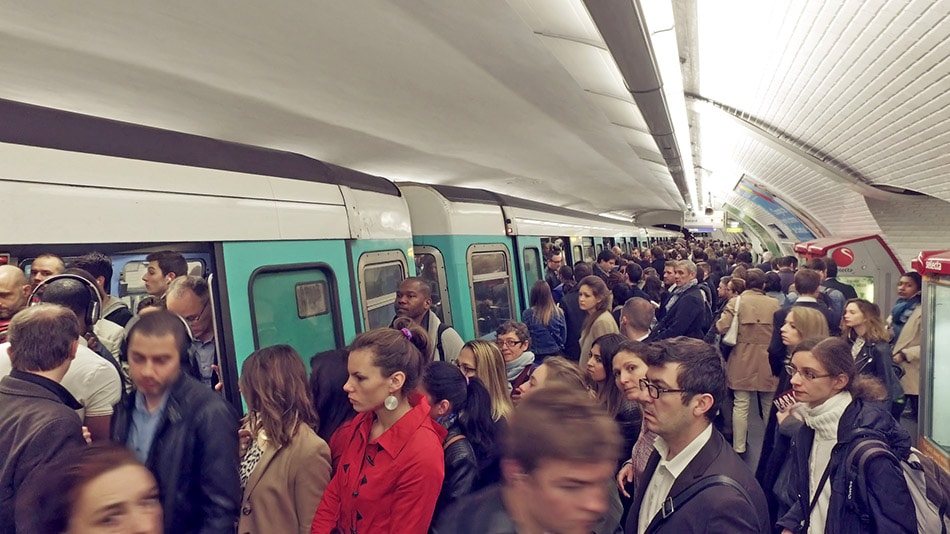
The Paris Metro is generally very safe and physical assaults are rare. Plus, police presence was stepped up considerably after the terror attacks a few years ago and tons of people ride the metro so there are always people around.
But petty crimes like pickpocketing and phone/bag snatching are relatively common.
How To Avoid Theft On The Paris Metro
Pickpockets target metro stops near popular tourist sights and the train that goes from the airport into the city. Pickpocketing is also more prevalent during rush hour when people pack onto the trains.
A zippered purse is a good deterrent as this will make most thieves move on to an easier victim. But it’s even better to find a bag that also has internal pockets with zippers as an extra line of defense. You’ll also want to wear your bag on your front.
For guys, it’s recommended that you put your wallet in your front pocket. It’s a good idea to buy a very slim wallet that only holds a couple of cards and some cash since carrying a bulky wallet in your front pocket isn’t comfortable.
Next, if possible, avoid standing/sitting next to the door as many thieves will grab your phone/bag right as the metro doors are closing so you can’t chase them—this is how most phones on the metro are stolen.
Is Paris Safe For Solo Women Travelers?
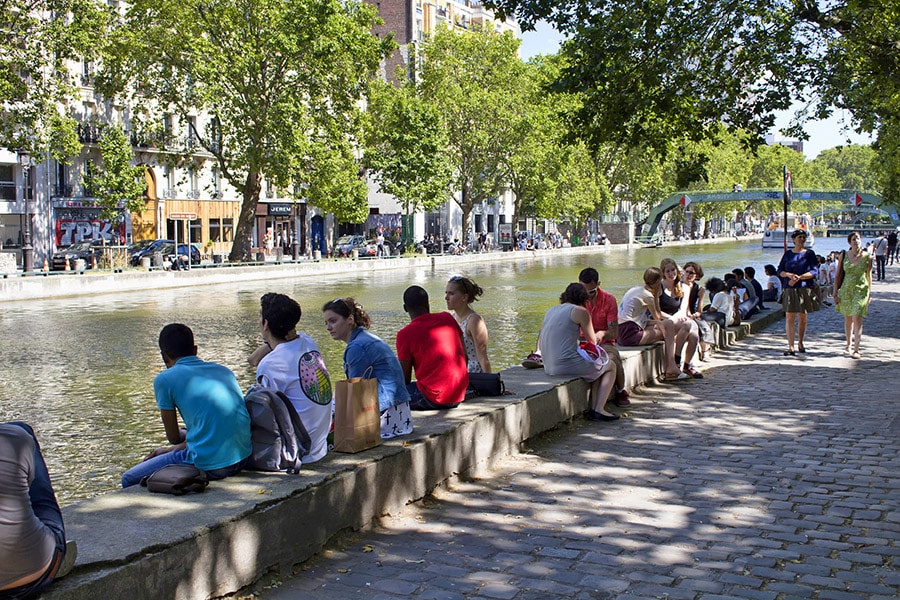
Paris is a safe city for solo women travelers, but as with any big city, there are always a few precautions you should follow:
- Street harassment is not uncommon so some women report everything from unwanted yet harmless flirting to persistent harassment—especially when you’re alone at night. Ignoring them will ward off a majority of men but don’t be afraid to pop into a bar or restaurant if you’re feeling unsafe.
- Simply acting as you belong and walking with purpose will cut down on a good amount of unwanted attention. While not always easy, it’s helpful if you actually have an idea of how to get to where you’re going so you’re not looking at Google Maps every 2 minutes.
- In some cases, making eye contact and/or smiling at someone can be interpreted as an invitation to chat.
- All solo travelers should take extra precautions when using the ATM. I recommend only using indoor ATMs at a bank branch and doing it during business hours—this will cut down on any theft attempts.
- Many female travelers opt for staying in hostels while traveling as this gives you a built-in group of people you can go out with if you like—check out my guide to the best hostels in Paris.
- Taking a free walking tour is a good way to explore a city solo while also being part of a larger group. You might even meet people to hang out with.
- Carry a bag/purse with zippers. Ideally, your bag will also have internal zippered pockets where you can keep your wallet, phone, and other valuables. Pacsafe makes some fashionable bags with built-in anti-theft features.
- I highly recommend having fast, reliable high-speed mobile data for your phone—which means getting a European SIM card (your domestic plan might work in France but it will be slow). I’ve used SIM Options in the past but you can read more in my guide on How To Buy SIM Cards in Europe.
Is It Safe To Visit Paris Alone?
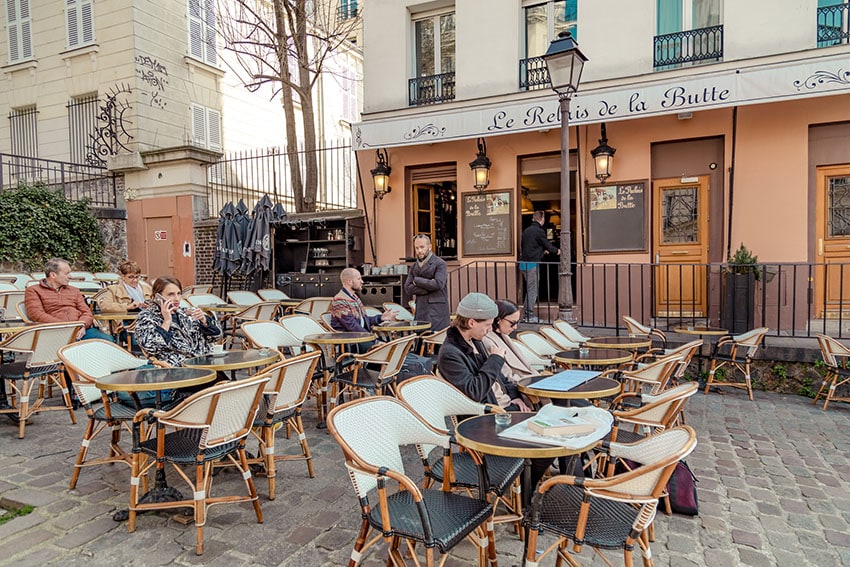
Paris is a safe city for solo travelers so if you stick to central Paris it’s very unlikely you’ll experience any kind of issues.
Here are a few of my top travel tips for visiting Paris alone:
- Fast and reliable high-speed mobile data is a must-have for any solo traveler—which means getting a European SIM card (your domestic plan might work in France but it will be slow). I recommend buying from SIM Options but you can read more in my guide on How To Buy SIM Cards in Europe.
- Avoid using outdoor ATMs alone. Most banks have indoor ATMs that are much safer for solo travelers.
- Walking with purpose and confidence is one of the best ways to avoid getting hassled.
- On this note, it’s smart to have an idea of how to get to where you’re going so before heading out it helps to familiarize yourself with the general directions.
- Staying in a hostel is a great way to travel alone since it gives you an instant friend group. You’ll often find other solo travelers who are eager to hang out—check out my guide to the best hostels in Paris.
- Taking one of the many free Paris walking tours is a good way to explore a city solo while also being part of a larger group.
- Don’t keep all your credit cards, debit cards, and cash together in the space place because if they’re stolen then you’re totally out of luck. So always keep your various forms of money spread out across multiple spots.
Is It Safe To Walk Around Paris At Night?
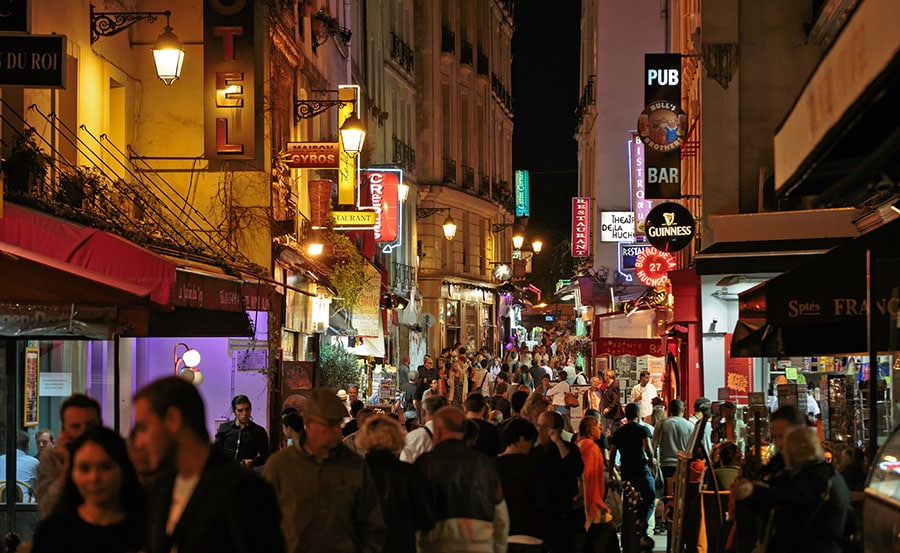
Most of central Paris is perfectly safe at night—especially in the bustling nightlife parts of the city that are always filled with people. Furthermore, if you visit in the summer, you’ll quickly notice how it doesn’t get dark until around 10:30 so it barely feels like “night” at 11 pm.
A few quieter neighborhoods will empty out at night so you might feel a bit uneasy where no one else is around.
As outlined earlier in this article, there are a few neighborhoods that aren’t the best at night like areas around Gade du Nord and Gare de l’Est (but the areas around all train stations tend to be sketchy).
Sections of the Northern and North-Eastern parts of Paris aren’t the best places to hang around after dark.
The Pigalle neighborhood around the Moulin Rouge is the city’s Red Light district so it feels seedy because of the adult entertainment venues but it’s generally a safe neighborhood. It’s also being taken over by hipsters so there are some cool non-adult nightlife options.
General Paris Safety Tips
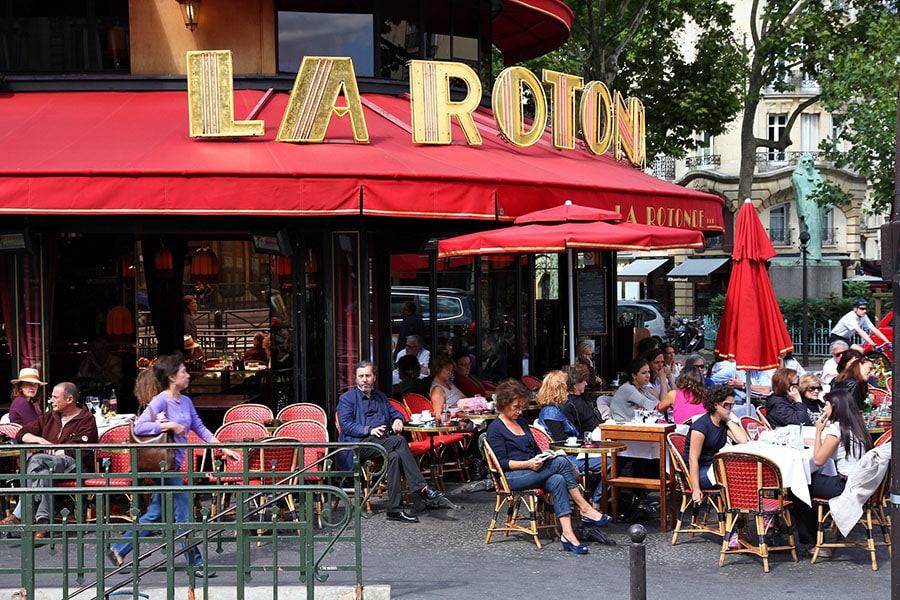
Here’s a big list of random helpful tips to help keep you safe in Paris.
Get a European SIM Card For High-Speed Data
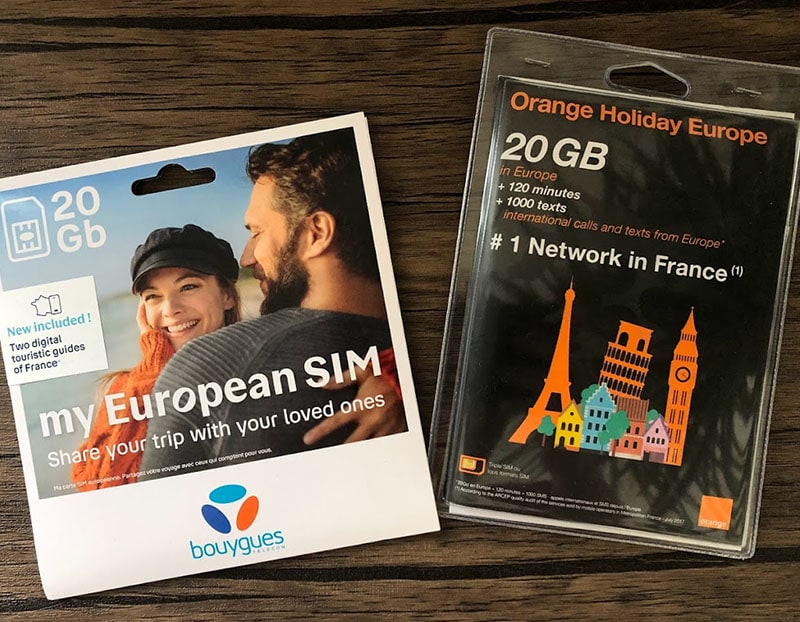
Having fast, reliable high-speed data for your phone can get you out of a jam quickly. It’s highly recommended that you buy a European SIM card instead of relying on your domestic plan’s international service (which will be slow) or trying to find free wifi.
I recommend pre-purchasing a SIM card (I used SIM Options on my last trip to Europe) so you don’t have to deal with finding a mobile phone store in Paris. I also suggest reading more about SIM Cards/Data Plans in my guide on How To Buy SIM Cards in Europe.
Consider Buying An Anti-Theft Bag
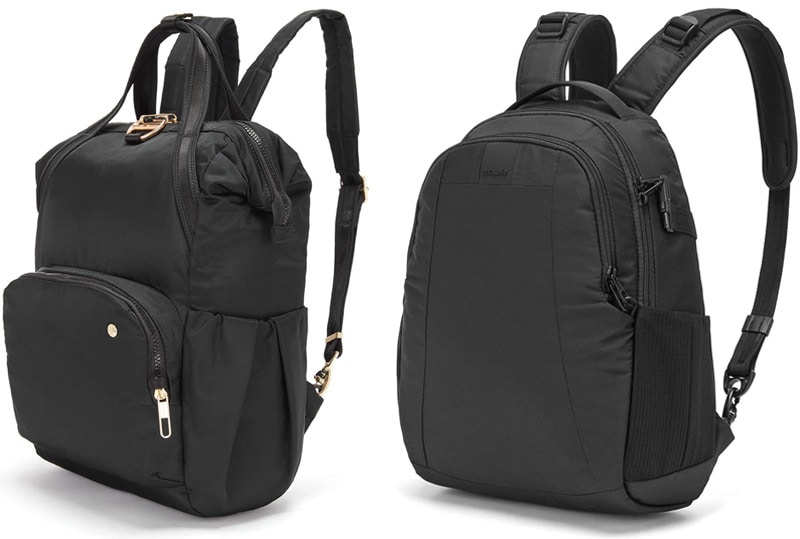
There are a number of backpacks, bags, and purses on the market with anti-theft features like extra lockable zippered pockets, internal anti-slash mesh wire, and RFID shielding. These features come in very handy and add a lot of peace of mind while traveling.
I recommend checking out Pacsafe because many of their bags are nice-looking (but a bit expensive).
Create A Plan For Your Visit To Paris
Having an idea of what you want to see, do, and eat in Paris will help give you more confidence—and thus make you less of a target for thieves. Check out my Paris Travel Guide to learn more of the ins and outs of visiting Paris. Also, check out my guide to the best things to do in Paris to see everything this amazing city has to offer.
Don’t Show Off Flashy Watches & Jewelry
Paris has been hit with a string of assaults/robberies by thieves who’ve been targeting people wearing expensive watches and jewelry.
Avoid Political Protests
Paris is no stranger to political protests. And while most are peaceful, it’s best to avoid them just in case things turn violent.
Pack Light To Become Less Of A Target
Anyone carrying around a suitcase or travel backpack becomes more of a target to thieves. But anyone lugging around a massive suitcase or huge travel backpack is automatically seen as a bumbling, clueless tourist just waiting to get ripped off. That’s why packing as light as possible is a smart move. Check out my Travel Europe Packing List for Women for female-specific packing advice. You can also read my guide to the Best Travel Backpacks for Women and my article on the Best Travel Shoes For Women.
Buy Travel Insurance
Getting injured abroad or having to visit a foreign hospital because of an illness can lead to huge medical bills and there is a good chance your normal health insurance won’t cover much (or anything)—that’s why travel insurance is highly suggested. I recommend World Nomads since they’re affordable and they offer a solid amount of coverage.

No Funny Business
The Savvy Backpacker is reader-supported. That means when you buy products/services through links on the site, I may earn an affiliate commission—it doesn’t cost you anything extra and it helps support the site.
Thanks For Reading! — James
Questions? Learn more about our Strict Advertising Policy and How To Support Us.



